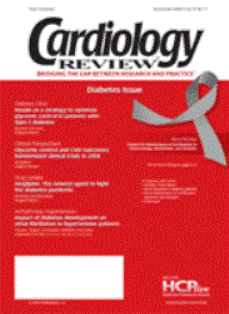Publication
Article
Cardiology Review® Online
Rate control versus rhythm control for atrial fibrillation in a hypertensive elderly patient with diabetes
A 77-year-old woman with diabetes, hypertension, and hypothyroidism was first assessed as an outpatient in 2004.
A 77-year-old woman with diabetes, hypertension, and hypothyroidism was first assessed as an outpatient in 2004. An electrocardiogram demonstrated normofrequent sinus rhythm and left ventricular hypertrophy with strain. Her blood pressure was 150/80 mm Hg and she was treated with furosemide (Lasix), amlodipine (Norvasc), valsartan in combination with hydroclorothiazide (Diovan HCT), atenolol (Tenormin), metformin (Glucophage), glimepiride (Amaryl), aspirin, atorvastatin (Lipitor), and levothyroxine (Synthroid). Echocardiography showed concentric hypertrophy, moderate mitral valve regurgitation, and left and right atrial enlargement.
In 2006, the patient was admitted to the hospital because of a cerebral stroke with symptoms of aphasia and right-sided hemispatial neglect. A diagnosis of atrial fibrillation (AF) was made, and she was treated with warfarin (Coumadin) and her beta blocker was changed to metoprolol (Toprol).
In the spring of 2008, the patient was readmitted to the hospital because of chest pain and rapid AF. She was started on digitoxin, the metoprolol dosage was increased, and her antihypertensive regimen was intensified. The laboratory tests demonstrated slightly depressed levels of thyroid-stimulating hormone (TSH); thus, the levothyroxine dose was reduced. Repeated echocardiography confirmed previous findings. Because the patient had no symptoms from her normofrequent AF, we favored optimizing her antihypertensive and rate control treatments instead of focusing on rhythm control. She was discharged from the hospital with the following once-daily medications: metoprolol, 100 mg; digitoxin, 50 μg; valsartan hydroclorothiazide, 160/25; amlodipine, 10 mg; furosemide, 30 mg; levothyroxin, 100 μg (5/7); atorvastatin, 20 mg; glimepiride 4 mg; metformin 2.5 g; and warfarin.






